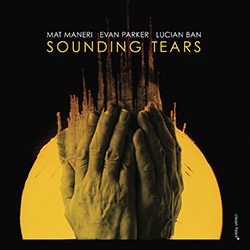
Viola improviser and composer Mat Maneri leads this trio with British UK legend Evan Parker on soprano and tenor saxophone and Romanian ex-patriot and frequent collaborator Lucian Ban on piano, for ten compositions blending tradition, song, and improvisational tactics, recalling 20th century modern classical music in addition to jazz.
Out of Stock
Quantity in Basket: None
Log In to use our Wish List
Shipping Weight: 3.00 units
Sample The Album:
Mat Maneri-viola
Evan Parker-soprano saxophone, tenor saxophone
Lucian Ban-piano
Click an artist name above to see in-stock items for that artist.
UPC: 5609063004250
Label: Clean Feed
Catalog ID: CF425
Squidco Product Code: 24163
Format: CD
Condition: New
Released: 2017
Country: Portugal
Packaging: Cardboard Gatefold
Recorded at Tedesco Studios, in Paramus, New Jersey, September 21st, 2014, by Tom Tedesco.
"Over the course of a quarter century career American violist Mat Maneri has "changed the way the jazz world listens to the violin and viola" (AllAboutJazz.com) and has established an international reputation as one of the most original and compelling artists of his generation. Maneri possesses an immediately recognizable sound and approach which marries the distinct worlds of jazz and microtonal music in a fluid, remarkably expressive fashion which The Wire dubbed "endlessly fascinating." Over the course of his career, Maneri has worked with 20th century icons of improvised music including his father Joe Maneri, Cecil Taylor, Tim Berne, William Parker, Craig Taborn and many others.
For Sounding Tears, his first release under his own name (not as co-leader or collaborator) in 12 years, Maneri has enlisted legendary British saxophonist Evan Parker, one of European avant-garde's leading voices for the past four decades, alongside his long-standing collaborator, Romanian expat, pianist Lucian Ban. The improvisations conjured by these improvisers bespeak a music of the new millennium - tender and lyrical while also angular, gritty and suspenseful.
Reflecting on Sounding Tears Maneri says: "Music begins before music. As an improviser the first note I play sets in motion the whole world. As a trio, where does musical intimacy come from? Is it improvisation, is it chamber music? Is it jazz? The music on this album, the experience, empathy and the shared history that Evan and Lucian bring to Sounding Tears, is our answer to those questions."
Maneri and Ban have been working together for close to a decade spanning a number of different projects. They met while working on Ban and bassist John Hebert's Enesco Re-Imagined (Sunnyside, 2009). On one piece played a memorable duo, so remarkable that they didn't hesitate to begin touring as a duo. This touring relationship ultimately resulted in their acclaimed recording, Transylvanian Concert (ECM, 2013). It was at the Bucharest release show for Transylvanian Concert that they invited Parker to be a special guest. The music was elevated to a new plane.
The three played a few more times together before heading to Tedesco Studios in New Jersey in 2016 to record what would become Sounding Tears. The music on the album showcases a side of the saxophonist's playing not often heard on record - a more introverted, crooked way of phrasing, tenderly enveloped in Maneri and Ban's sonic universe. Over the course of eight free improvisations and two written melodies, this trio showcases a distinct language; a language built on equality and listening with no grandstanding or hierarchical principles at play.
A notable influence on this album's concept was the seminal 1995 ECM album Time Will Tell by Paul Bley, Evan Parker and Barre Phillips. This album meant an immeasurable amount to both Maneri and Ban. A sense of space invoked throughout and the collective phrasing were influential to both musicians. Bley was also one of the first people to give Joe Maneri and Mat Maneri the recognition they so deserved. Bley recommended them to ECM Records' Manfred Eicher, with whom they went on to record with Barre Phillips and many others in a series of albums which are still cherished for their inventiveness.
Maneri sums up the spirit of Sounding Tears. "It's like Lester Young mixed with something insane; rooted in the past of an alternate universe which may have never existed." No other words can describe the dualities that this record holds within itself - the music is both cutting-edge and remarkably progressive while also being firmly rooted in tradition, song, and improvisational tactics which recall 20th century modern classical music in addition to jazz.
The sound of Sounding Tears is the sound of three master musicians playing with integrity and heart, listening as much as asserting, letting silence dictate as much as sonic density. It's a treat and a delight to hear a re-contextualized Evan Parker sitting patiently, enmeshing himself in a codified universe that Maneri and Ban have been crafting for several years."-Clean Feed

The Squid's Ear!
Artist Biographies
• Show Bio for Mat Maneri "Mat Maneri was born in 1969, and started studying violin at age five. He studied privately with Julliard String Quartet founder Robert Koff, and with bass virutuoso Miroslav Vitous. Mat received a full scholarship as the principal violinist at Walnut Hill High School, but left school to pursue a professional career in music. By 1990, Mat founded the critically acclaimed Joe Maneri Quartet with Randy Peterson. Mat started releasing records as a leader in 1996, and has developed four working ensembles. Pianists Paul Bley, Cecil Taylor, Matthew Shipp, and Borah Bergman have called upon Matt to perform with them in such venues as the Montreal Jazz Festival, the Library of Congress, and concert stages across Europe. Mat also enjoys a strong relationship with bassists Ed Schuller, Mark Dresser, William Parker, Michael Formanek, Barre Phillips, and John Lockwood. Never to be boxed in, Mat has also worked with Joe Morris, John Medeski, Tim Berne, Cecil McBee, T.K. Ramakrishnan, Franz Kogelman, Roy Campbell, Spring Heel Jack, Draze Hoops, and appears on an Illy B Eats remix CD. Mat presently teaches privately and through the New School / NYC, and performs and records worldwide." ^ Hide Bio for Mat Maneri • Show Bio for Evan Parker "Evan Parker was born in Bristol in 1944 and began to play the saxophone at the age of 14. Initially he played alto and was an admirer of Paul Desmond; by 1960 he had switched to tenor and soprano, following the example of John Coltrane, a major influence who, he would later say, determined "my choice of everything". In 1962 he went to Birmingham University to study botany but a trip to New York, where he heard the Cecil Taylor trio (with Jimmy Lyons and Sunny Murray), prompted a change of mind. What he heard was "music of a strength and intensity to mark me for life ... l came back with my academic ambitions in tatters and a desperate dream of a life playing that kind of music - 'free jazz' they called it then." Parker stayed in Birmingham for a time, often playing with pianist Howard Riley. In 1966 he moved to London, became a frequent visitor to the Little Theatre Club, centre of the city's emerging free jazz scene, and was soon invited by drummer John Stevens to join the innovative Spontaneous Music Ensemble which was experimenting with new kinds of group improvisation. Parker's first issued recording was SME's 1968 Karyobin, with a line-up of Parker, Stevens, Derek Bailey, Dave Holland and Kenny Wheeler. Parker remained in SME through various fluctuating line-ups - at one point it comprised a duo of Stevens and himself - but the late 1960s also saw him involved in a number of other fruitful associations. He began a long-standing partnership with guitarist Bailey, with whom he formed the Music Improvisation Company and, in 1970, co-founded Incus Records. (Tony Oxley, in whose sextet Parker was then playing, was a third co-founder; Parker left Incus in the mid-1980s.) Another important connection was with the bassist Peter Kowald who introduced Parker to the German free jazz scene. This led to him playing on Peter Brötzmann's 1968 Machine Gun, Manfred Schoof's 1969 European Echoes and, in 1970, joining pianist Alex von Schlippenbach and percussionist Paul Lovens in the former's trio, of which he is still a member: their recordings include Pakistani Pomade, Three Nails Left, Detto Fra Di Noi, Elf Bagatellen and Physics. Parker pursued other European links, too, playing in the Pierre Favre Quartet (with Kowald and Swiss pianist Irene Schweizer) and in the Dutch Instant Composers Pool of Misha Mengelberg and Han Bennink. The different approaches to free jazz he encountered proved both a challenging and a rewarding experience. He later recalled that the German musicians favoured a "robust, energy-based thing, not to do with delicacy or detailed listening but to do with a kind of spirit-raising, a shamanistic intensity. And l had to find a way of surviving in the heat of that atmosphere ... But after a while those contexts became more interchangeable and more people were involved in the interactions, so all kinds of hybrid musics came out, all kinds of combinations of styles." A vital catalyst for these interactions were the large ensembles in which Parker participated in the 1970s: Schlippenbach's Globe Unity Orchestra, Chris McGregor's Brotherhood of Breath, Barry Guy's London Jazz Composers Orchestra (LJCO) and occasional big bands led by Kenny Wheeler. In the late 70s Parker also worked for a time in Wheeler's small group, recording Around Six and, in 1980, he formed his own trio with Guy and LJCO percussionist Paul Lytton (with whom he had already been working in a duo for nearly a decade). This group, together with the Schlippenbach trio, remains one of Parker's top musical priorities: their recordings include Tracks, Atlanta, Imaginary Values, Breaths and Heartbeats, The Redwood Sessions and At the Vortex. In 1980, Parker directed an Improvisers Symposium in Pisa and, in 1981, he organised a special project at London's Actual Festival. By the end of the 1980s he had played in most European countries and had made various tours to the USA, Canada, Australia, New Zealand and Japan. ln 1990, following the death of Chris McGregor, he was instrumental in organising various tributes to the pianist and his fellow Blue Notes; these included two discs by the Dedication Orchestra, Spirits Rejoice and lxesa. Though he has worked extensively in both large and small ensembles, Parker is perhaps best known for his solo soprano saxophone music, a singular body of work that in recent years has centred around his continuing exploration of techniques such as circular breathing, split tonguing, overblowing, multiphonics and cross-pattern fingering. These are technical devices, yet Parker's use of them is, he says, less analytical than intuitive; he has likened performing his solo work to entering a kind of trance-state. The resulting music is certainly hypnotic, an uninterrupted flow of snaky, densely-textured sound that Parker has described as "the illusion of polyphony". Many listeners have indeed found it hard to credit that one man can create such intricate, complex music in real time. Parker's first solo recordings, made in 1974, were reissued on the Saxophone Solos CD in 1995; more recent examples are Conic Sections and Process and Reality, on the latter of which he does, for the first time, experiment with multi-tracking. Heard alone on stage, few would disagree with writer Steve Lake that "There is, still, nothing else in music - jazz or otherwise - that remotely resembles an Evan Parker solo concert." While free improvisation has been Parker's main area of activity over the last three decades, he has also found time for other musical pursuits: he has played in 'popular' contexts with Annette Peacock, Scott Walker and the Charlie Watts big band; he has performed notated pieces by Gavin Bryars, Michael Nyman and Frederic Rzewski; he has written knowledgeably about various ethnic musics in Resonance magazine. A relatively new field of interest for Parker is improvising with live electronics, a dialogue he first documented on the 1990 Hall of Mirrors CD with Walter Prati. Later experiments with electronics in the context of larger ensembles have included the Synergetics - Phonomanie III project at Ullrichsberg in 1993 and concerts by the new EP2 (Evan Parker Electronic Project) in Berlin, Nancy and at the 1995 Stockholm Electronic Music Festival where Parker's regular trio improvised with real-time electronics processed by Prati, Marco Vecchi and Phillip Wachsmann. "Each of the acoustic instrumentalists has an electronic 'shadow' who tracks him and feeds a modified version of his output back to the real-time flow of the music." The late 80s and 90s brought Parker the chance to play with some of his early heroes. He worked with Cecil Taylor in small and large groups, played with Coltrane percussionist Rashied Ali, recorded with Paul Bley: he also played a solo set as support to Ornette Coleman when Skies of America received its UK premiere in 1988. The same period found Parker renewing his acquaintance with American colleagues such as Anthony Braxton, Steve Lacy and George Lewis, with all of whom he had played in the 1970s (often in the context of London's Company festivals). His 1993 duo concert with Braxton moved John Fordham in The Guardian to raptures over "saxophone improvisation of an intensity, virtuosity, drama and balance to tax the memory for comparison". Parker's 50th birthday in 1994 brought celebratory concerts in several cities, including London, New York and Chicago. The London performance, featuring the Parker and Schlippenbach trios, was issued on a highly-acclaimed two-CD set, while participants at the American concerts included various old friends as well as more recent collaborators in Borah Bergman and Joe Lovano. The NYC radio station WKCR marked the occasion by playing five days of Parker recordings. 1994 also saw the publication of the Evan Parker Discography, compiled by ltalian writer Francesco Martinelli, plus chapters on Parker in books on contemporary musics by John Corbett and Graham Lock. Parker's future plans involve exploring further possibilities in electronics and the development of his solo music. They also depend to a large degree on continuity of the trios, of the large ensembles, of his more occasional yet still long-standing associations with that pool of musicians to whose work he remains attracted. This attraction, he explained to Coda's Laurence Svirchev, is attributable to "the personal quality of an individual voice". The players to whom he is drawn "have a language which is coherent, that is, you know who the participants are. At the same time, their language is flexible enough that they can make sense of playing with each other ... l like people who can do that, who have an intensity of purpose." " ^ Hide Bio for Evan Parker • Show Bio for Lucian Ban "Nominated twice (2005 & 2006 by JJA critic Virgil Mihaiu) for 'Best European Jazz Musician" / The Hans Koller Foundation in Austria, pianist and composer Lucian Ban was born in Cluj - Transylvania, Romania. After private piano/harmony lessons he studies composition at Bucharest Music Academy from 1992 to 1995. He establishes the group Jazz Unit in 1995 and releases two albums as a leader for the Green Records label in Romania. In 1999 he moves to New York where he graduates in Jazz & Contemporary Music at New School University. His American debut recording "Somethin" Holy" in duet with bari sax Alex Harding was awarded 4 stars by All Music Guide, and was followed by the quintet album "Premonition" (2003), "Tuba Project" (feat. Bob Stewart, 2006) "Playground" (feat Jorge Sylvester, 2006), and "The Romanian-American Jazz Suite" in 2008 by Sam Newsome & Lucian Ban Ensemble. In 2003 The Lumination Ensemble co-lead with Alex Harding and featuring drum legend Barry Altschul was nominated "ONE OF THE BEST 10 SHOWS OF 2003" by All About Jazz NYC. In 2010 he releases the third stream extrvaganza "Enesco Re-Imagined" with John Hebert for Sunnyside Records followed by ELEVATION Quartet featuring Abraham Burton, Eric McPherson and John Hebert. In 2013 he makes his major label debut for ECM Records with a duet with Grammy Nominee violist Mat Maneri. Since then he has played/recorded with: Alex Harding, Reggie Nicholson, Sam Newsome, Barry Altschul, Jorge Sylvester, Brad Jones, Bruce Williams, Pheeroan AkLaff, J.D.Allen, Bruce Cox, Hill Greene, Carlo DeRosa, Tony Malaby, Mark Helias, Gene Jackson, Badal Roy, Nasheet Waits, Bob Stewart, Gerald Cleaver, Derrek Phillips, etc." ^ Hide Bio for Lucian Ban
7/1/2025
Have a better biography or biography source? Please Contact Us so that we can update this biography.
7/1/2025
Have a better biography or biography source? Please Contact Us so that we can update this biography.
7/1/2025
Have a better biography or biography source? Please Contact Us so that we can update this biography.
Track Listing:
1. Blue Light 1:50
2. Da Da Da 7:19
3. The Rule Of Twelves 3:46
4. Blessed 7:43
5. This! 5:13
6. Sounding 3:27
7. Polaris 3:03
8. Scilence 8:22
9. Paralex 7:12
10. Hymn 3:53
May 2017
Improvised Music
Jazz
Free Improvisation
European Improvisation, Composition and Experimental Forms
NY Downtown & Metropolitan Jazz/Improv
Trio Recordings
Clean Feed
Staff Picks & Recommended Items
Jazz & Improvisation Based on Compositions
Search for other titles on the label:
Clean Feed.

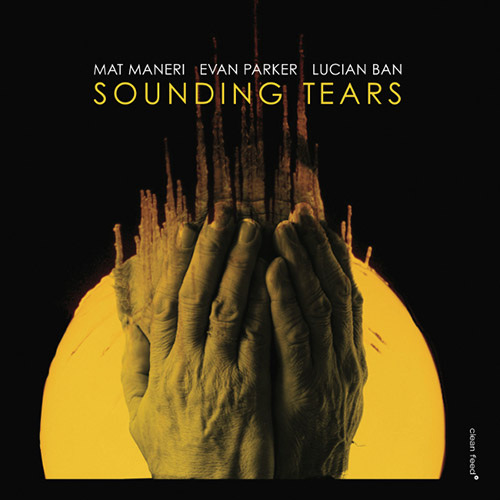
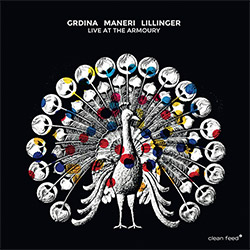
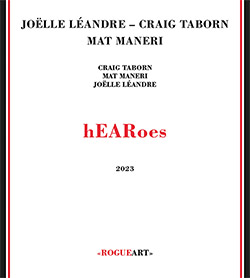
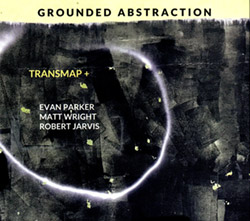

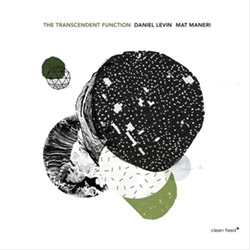

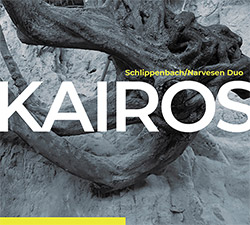






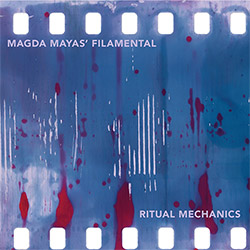


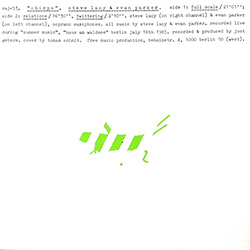
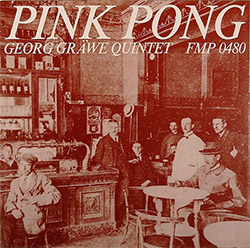
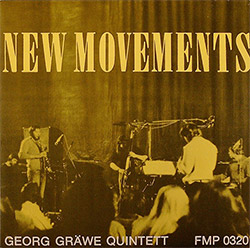
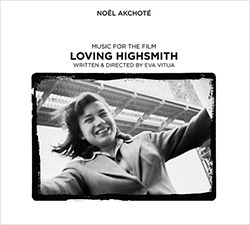
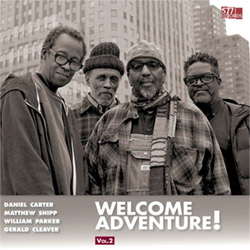

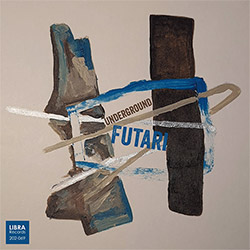


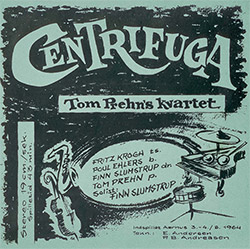










![Deupree, Jerome / Sylvie Courvoisier / Lester St. Louis / Joe Morris: Canyon [2 CDs]](https://www.teuthida.com/productImages/misc4/36404.jpg)


![Eternities: Rides Again [CASSETTE]](https://www.teuthida.com/productImages/misc4/36247.jpg)

![Lopez, Francisco: Untitled (2021-2022) [2 CDs]](https://www.teuthida.com/productImages/misc4/36438.jpg)




![Eventless Plot | Haarvol: The Subliminal Paths [CASSETTE + DOWNLOAD]](https://www.teuthida.com/productImages/misc4/36232.jpg)












![Eventless Plot | Francesco Covarino: Methexis [CASSETTE + DOWNLOAD]](https://www.teuthida.com/productImages/misc4/36231.jpg)



![Das B (Mazen Kerbaj / Mike Majkowski / Magda Mayas / Tony Buck): Love [VINYL]](https://www.teuthida.com/productImages/misc4/36329.jpg)



![Hemphill Stringtet, The: Plays the Music of Julius Hemphill [VINYL]](https://www.teuthida.com/productImages/misc4/36409.jpg)



![Halvorson, Mary Septet: Illusionary Sea [2 LPS]](https://www.teuthida.com/productImages/misc4/17952.jpg)






![Money : Money 2 [2 CDs]](https://www.teuthida.com/productImages/misc4/35894.jpg)




![Klinga, Erik: Elusive Shimmer [VINYL]](https://www.teuthida.com/productImages/misc4/36258.jpg)
![CHANGES TO blind (Phil Zampino): Volume 9 - I Wave on a Fine Vile Mist [CD + DOWNLOAD]](https://www.teuthida.com/productImages/misc4/36061.jpg)

![Wallmart / Rubbish: Asset Protection [split CD]](https://www.teuthida.com/productImages/misc4/35900.jpg)


![+Dog+: The Family Music Book Vol. 5 [2 CDs]](https://www.teuthida.com/productImages/misc4/35897.jpg)
![Kuvveti, Deli : Kuslar Soyledi [CASSETTE w/ DOWNLOAD]](https://www.teuthida.com/productImages/misc4/36107.jpg)

![Nakayama, Tetsuya: Edo Wan [CASSETTE w/ DOWNLOAD]](https://www.teuthida.com/productImages/misc4/36105.jpg)




![Yiyuan, Liang / Li Daiguo: Sonic Talismans [VINYL]](https://www.teuthida.com/productImages/misc4/35957.jpg)
![Brown, Dan / Dan Reynolds: Live At The Grange Hall [unauthorized][CASSETTE]](https://www.teuthida.com/productImages/misc4/36245.jpg)








![Palestine, Charlemagne / Seppe Gebruers: Beyondddddd The Notessssss [VINYL]](https://www.teuthida.com/productImages/misc4/36206.jpg)
![Palestine, Charlemagne / Seppe Gebruers: Beyondddddd The Notessssss [NEON GREEN VINYL]](https://www.teuthida.com/productImages/misc4/36207.jpg)

![Laubrock, Ingrid: Purposing The Air [2 CDs]](https://www.teuthida.com/productImages/misc4/35639.jpg)

![Yoko, Ono / The Great Learning Orchestra: Selected Recordings From Grapefruit [2 CDs]](https://www.teuthida.com/productImages/misc4/35841.jpg)









![Zorn, John / JACK Quartet: The Complete String Quartets [2 CDs]](https://www.teuthida.com/productImages/misc4/35609.jpg)

![Lonsdale, Eden: Dawnings [2 CDs]](https://www.teuthida.com/productImages/misc4/35480.jpg)



![Sorry For Laughing (G. Whitlow / M. Bates / Dave-Id / E. Ka-Spel): Rain Flowers [2 CDS]](https://www.teuthida.com/productImages/misc4/35985.jpg)

![Rolando, Tommaso / Andy Moor : Biscotti [CASSETTE w/ DOWNLOADS]](https://www.teuthida.com/productImages/misc4/36106.jpg)


![Electric Bird Noise / Derek Roddy: 8-10-22 [CD EP]](https://www.teuthida.com/productImages/misc4/35970.jpg)








![Elephant9 : Mythical River [VINYL]](https://www.teuthida.com/productImages/misc4/34624.jpg)



![Elephant9 with Terje Rypdal: Catching Fire [VINYL 2 LPs]](https://www.teuthida.com/productImages/misc4/35355.jpg)
![Deerlady (Obomsawin, Mali / Magdalena Abrego): Greatest Hits [VINYL]](https://www.teuthida.com/productImages/misc4/34876.jpg)







![Surplus 1980: Illusion of Consistency [CD]](https://www.teuthida.com/productImages/misc4/35069.jpg)
![Staiano, Moe: Away Towards the Light [VINYL + DOWNLOAD]](https://www.teuthida.com/productImages/misc4/35037.jpg)
![Coley, Byron: Dating Tips for Touring Bands [VINYL]](https://www.teuthida.com/productImages/misc4/17906.jpg)

![Lost Kisses: My Life is Sad & Funny [DVD]](https://www.teuthida.com/productImages/misc4/lostKissesDVD.jpg)